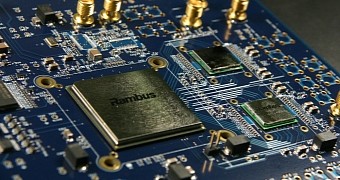Rambus has announced recently that it will introduce a new datacenter-oriented dynamic random access memory (DRAM) architecture in the coming weeks.
Rambus wants the new DRAM to shrink latencies and increase capacities of computer memory chips, which is extremely important for server and data centers operators as large amounts of data and in-memory databases need speed and low latency chips for better data managing efficiency.
Apparently, Rambus prepares to launch its new DRAM architecture close to Intel's IDF (Intel Development Forum) that will come next month. The new DRAM tech will want to solve challenges associated with capacities and latencies of DRAM servers, while Rambus also disclosed that at least two major producers of memory were interested in this new DRAM type.
According to KitGuru, the new architecture will not replace NAND flash that currently exists in most advanced DRAM drives, but it insists it'll be a new DRAM tech anyway. Rambus seems to believe that although it won't be a storage architecture revolution, it will improve on existing bandwidth and capacity requirements needed for faster data centers.
Better than standards, and that's why Intel should care
It's believed that Rambus chose the announcement date close to the IDF for practical reasons as the public will be more aware of any IT news that might come from Intel's conference, but it won't be directly tied with Intel's roadmap or any development to its chipsets whatsoever.
Apparently, the upcoming Xeon "Skylake" chipsets will need new powerful offers from DRAM manufacturers, and while Rambus' quite impressive line of products like its RDRAM, XDR and mobile XDRs weren't incredibly popular among server and datacenter users, now it's the time Intel and Rambus can make the dream team and effectively form a power couple with great DRAMs paired with the incredibly powerful Xeon-based "Purley" platform from Intel.
What it does matter is to basically impose its own standards on the server-dedicated memory market is Intel and its partners won't need to simply discard Rambus if it won't easily submit to pre-established standards. When the new Purley platform will be supporting 6TB of memory per socket, it'd be a shame for Rambus to lose such a power projecting potential.

 14 DAY TRIAL //
14 DAY TRIAL //